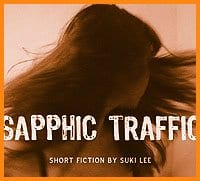Local Ottawa author and Capital Xtra columnist Suki Lee’s debut collection, Sapphic Traffic, is a mixed batch of short stories about lesbian characters who sometimes find themselves in emotional quagmires.
Overall, Sapphic Traffic is sexy, smart and compelling. Her prose is simple, evocative and often rewarding, despite the fact that Lee sometimes tells instead of shows, and does not quite know how to end some stories.
The stories vary in length. While some may run over 20 pages, others are curt, one-to-three page renderings of love, turmoil and often unhappy lives.
The Cyclist is such a story. The main character is a graying beauty living with her lover, but still reminiscing about a sexy, 26-year-old cyclist she once dated. She longs for something more. In the dizzily hallucinogenic story, Absinthe, Didier is a displaced Canadian who moves from Montreal to Paris to be with the woman she loves. Didier also develops a habit of drinking absinthe at a local café, resulting in a variety of green-tinted hallucinations and insecurities about her lover. Despite its strength as a confusing, disorienting piece about being in love and unsure, Absinthe demonstrates how Lee sometimes has trouble with abrupt endings.
A few other stories follow this pattern, such as 3 and The Clubhouse. Ironically, both are powerful pieces. In the first, two lovers, Ruth and Tracy, enter the seedy world of running drugs between Jamaica and Canada. It’s harrowing, nail-biting and gripping, but has an ending that leaves you panting in a disappointed way. In The Clubhouse, two childhood friends reunite and go to a shady biker bar. It’s about drifting apart after growing up, coming out of the closet and trying to figure out whether to accept your life as someone’s “chick” in a biker circle or to simply walk away. The characterization of the protagonists is strong, the atmosphere of the bar, Satan’s Best Headquarters, seethes with danger, but the resolution seems to happen a few pages too early.
Other stories run headlong into abrupt endings, including Small Places, which is supposed to be heartbreaking and creepy, but happens too quickly to fully affect the reader. In Elizabeth Cutler: Her Life, Elizabeth must decide between an unhappy marriage and a potential lover of the same sex. The story seems cut short. Sleep recounts a patient/psychiatrist exchange which makes you want the relationship to go further, as well as the story.
Lee’s portrayals of unhappy women seem unnervingly authentic. A protagonist wants to get lucky in Amsterdam. Instead, a manipulative painter uses the main character as a model. A daughter hasn’t spoken to her mother in years because the mother accidentally walked in on some girl-girl action. Interestingly, in some of these cases, Lee hints at a glimmer of resolution, a possibility of change, instead of a head-spinning conclusion. A story that gleams with such hope in the darkness is entitled Night Walk.
The reader might think Night Walk is merely about a break-up, but there is more at work here. We meet Anna, the protagonist, in a slightly melodramatic description as she lugs around a backpack which contains all of her belongings. Her girlfriend’s kicked her out. The story turns nerve-wracking and is sometimes hard to read because Lee manages to place the reader in the midst of darkness. Somehow, Night Walk also manages to be touching.
The author also knows how to have fun, cutting the gloom with tales such as Scent and Only Once, which could both have been prose poems. One is an ode of the intimate variety, while the other is a ballad to a potential lover. Only Once leaves the reader hedging their bets between what is reality and fantasy. Taped, another story, is just a plain fun piece about a woman trying to look a little younger by using an odd technique.
Ironically, one of the best stories, In Purdah, has a wordy beginning that almost reads like journalism, but has an ending that is like a kick to your stomach. As in Absinthe, a character visits their lover in a strange country, this time Bangladesh, where they must act closeted at all costs. Having lived in and traveled to several different countries, Lee shows a good eye for cultural differences. The arrogance of a Canadian abroad may surprise readers.
As a debut collection, Sapphic Traffic is not consistent, but the mediocre stories are still rewarding in their treatment of characters, dialogue and situations.
Despite any weaknesses with sudden endings and over-telling, Lee has a voice that readers should hear again – and the louder, the better.
SAPPHIC TRAFFIC.
Short Fiction by Suki Lee.
Conundrum Press.
OTTAWA LAUNCH OF SAPPHIC TRAFFIC.
Fri, Jan 30, 2004. 8pm.
SAW Gallery (Arts Court). 67 Nicholas St.
For inquiries, please contact suki@sukilee.com.

 Why you can trust Xtra
Why you can trust Xtra


